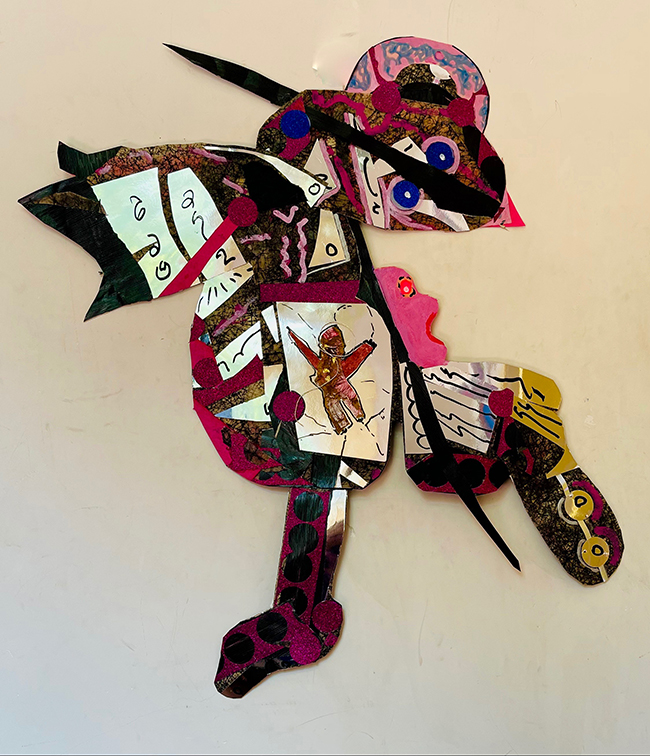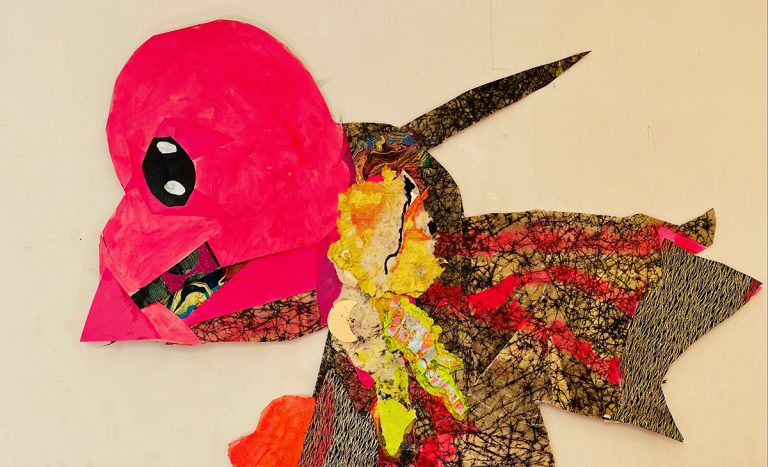Aliza Thomas is an artist, papermaker, art teacher, and a dedicated practitioner and teacher of Qigong and Taijiquan. Based in the Netherlands, she originally hails from Israel, and her life is a vibrant tapestry woven with experiences from across the globe. As a mother of three and grandmother of three, her familial ties are as strong as her creative impulses. Aliza’s journey into the world of art is one that spans continents and decades, having studied art in Brussels, Paris, and Japan. Her artistic practice is deeply rooted in the belief that creativity is a powerful tool, one that can be utilized in both the most challenging and joyous circumstances. Her work, often characterized by its handmade paper on canvas combined with acrylics, is a reflection of a lifetime dedicated to exploration and expression. One of her artworks, titled “I took a piece of the moon!” encapsulates her drive to always seek something out of the ordinary, transforming the mundane into the extraordinary.

Aliza Thomas’s approach to art is anything but conventional. One of the most intriguing aspects of her work is her affinity for creating double-sided pieces. This practice, though it might perplex or even frustrate some curators, is an integral part of her artistic expression. The concept of double-sidedness in her work isn’t just a quirky gimmick; it represents a deeper, almost philosophical exploration of duality and perspective.

Aliza’s double-sided pieces are a bit of a rebellion against the traditional canvas, which dictates a single focal point, a single story. By creating two sides to her artworks, she challenges this norm, suggesting that a narrative or an emotion is never just one thing. It’s multifaceted, layered, and ever-changing depending on the perspective of the viewer.
One of her double-sided works features an intricate play of materials and textures. On one side, she narrates the story of identity and perception: “They told me: You are glass, but we couldn’t believe that. They told me: You are metal but only I am shiny, not my other side.” Here, Aliza delves into the theme of duality within self-perception, how the world sees us versus how we see ourselves. The materials used—glass, metal, and their inherent qualities—serve as metaphors for these contrasting perceptions. Glass, often seen as fragile and transparent, contrasts with metal, which is solid and reflective, but only in certain aspects.
On the reverse, the narrative continues, but the focus shifts to nature and reflection: “You are water and we shine, mirroring the sun, yet one side shines. We are a pond, a lake, a puddle, mirroring sun and stars, falcons and deer come to drink watching mirrors double face.” This side of the piece is a meditation on nature’s role in the human experience, on how reflection, both literal and metaphorical, shapes our understanding of the world. The duality here is not just in the materials or the imagery, but in the very act of reflection—how it can show us different truths depending on where we stand.
For Aliza, the practical benefits of these double-sided pieces are undeniable. She humorously refers to them as a “2 for the price of 1” deal, a clever way to conserve materials while expanding her creative possibilities. But beyond the practicality, there’s a joy in the challenge of working this way. The act of creating on both sides of the canvas forces her to think more dynamically, to consider how each side interacts with the other, and how they might be perceived individually and together.
This isn’t the first time Aliza has experimented with the reverse side of her artwork. In the past, she used to write poems on the backs of her pieces. This idea, however, was met with mixed reactions and eventually phased out. But the experience informed her current practice, where the visual and thematic dialogues on both sides of the canvas take precedence.
Aliza’s art, especially her double-sided works, invites viewers to look deeper, to not take things at face value. Whether it’s the moon reduced in size because she dared to take a piece of it or the shimmering play between glass, metal, and water, her work is a testament to the endless possibilities of perspective. Through her art, Aliza Thomas encourages us all to embrace the unconventional, to find joy in duality, and to always, always look beyond what is immediately visible.

